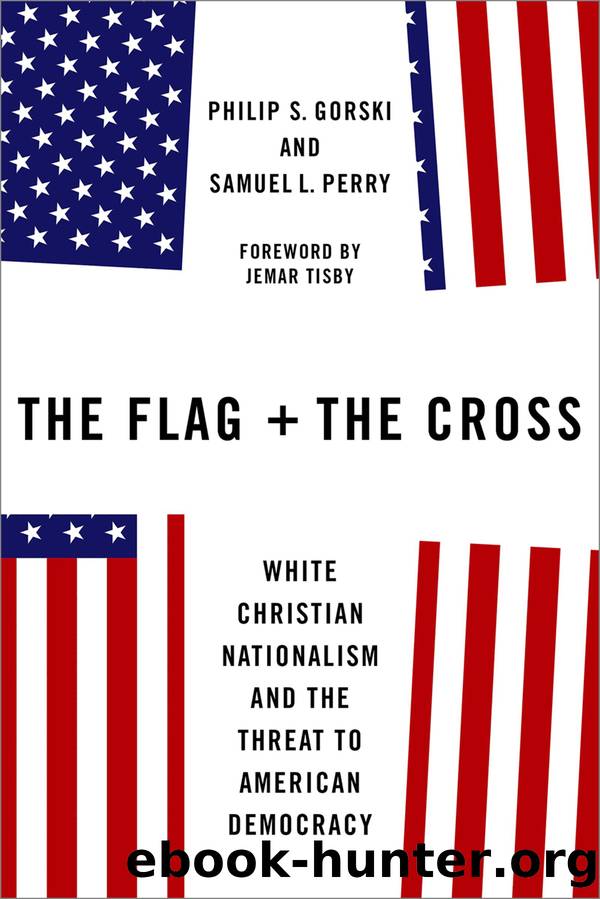The Flag and the Cross by Philip S. Gorski

Author:Philip S. Gorski
Language: eng
Format: epub
Publisher: Oxford University Press
Published: 2022-03-15T00:00:00+00:00
Figure 3.1 Percentage of white Americans who have serious moral problems with socialism across their agreement with views sacralizing the US Constitution.
Source: Public Discourse and Ethics Survey (Wave 6; November 2020)
The libertarian ideas of the Tea Party movement were entangled with the ethno-traditionalist impulses of white Christian nationalism.
âMAGA!â The Secularization of White Christian Nationalism
How could conservative evangelicals who claimed to defend âfamily values,â âcharacter,â and âcivilityâ support a thrice-married, egomaniacal real-estate mogul who paid off porn stars? Outside observers have been asking some version of this question ever since Trumpâs early victories in the 2016 Republican presidential primaries. So have some elite insiders, shocked to discover that their church and their party were not what they thought they were, at least not anymore.
The answer is complicated.
The first thing to note is that Trumpâs MAGA narrative can be understood as a semi-secularized version of white Christian nationalismâs deep story. Trumpâs narrative is shorn of the sorts of biblical references and allusions that peppered earlier presidentsâ speeches. But the MAGA narrative still has many parallels with the deep story. The most obvious one is between the apocalyptic strand of white Christian nationalism and the catastrophizing aspect of MAGA. Premillennialists believe that there will be a final battle between good and evil, a life-and-death struggle between natural and supernatural forces that is visible to them, but invisible to unbelievers. Trumpâs worldview is similar. âDisasterâ is one of his favorite words. He sees life as an endless battle between us and them. He sees hidden conspiracies everywhere he looks. We should not be surprised that Trumpâs rhetoric resonated so strongly with many white devotees of Christian nationalism. Their deep stories are quite similar.
If self-identified evangelicals respond to Trumpâs semi-secularized version of white Christian nationalism, then this is in part because the evangelical label itself has become semi-secularized as well. Political scientist Ryan Burge has shown that an increasing number of Americans outside of evangelical Protestant traditions (such as Catholics, Mormons, Eastern Orthodox Christians, Jews, and even Muslims and Hindus) are now identifying as âevangelical or born-again Christians.â He shows that this is largely driven by the merging of Republican and evangelical identities, so that when Americans are asked whether theyâre âevangelical,â they increasingly read this not as a question about their theological beliefs, but whether they identify with the Republican Party.
The MAGA narrative is not only a secularized white Christian nationalism; it is a reactionary version. In the Puritansâ Promised Land narrative, recall, blood was the master metaphor that linked blood belonging (race), blood sacrifice (religion), and blood conquest (nation). In the sanitized 20th-century version of white Christian nationalism known as âAmerican exceptionalism,â the blood metaphors were diluted into polite euphemisms such as âultimate sacrifice.â In Trumpâs âpolitically incorrectâ version, blood reappeared. Sometimes it did so explicitly, as in the apocryphal story about âMuslim terroristsâ executed with âbullets dipped in pigâs bloodâ that he often worked into his stump speech.13 Given the importance of blood sacrifice in many versions of Christian theology, and the mystical powers often attributed to it, Trumpâs blood rhetoric probably resonated with many.
Download
This site does not store any files on its server. We only index and link to content provided by other sites. Please contact the content providers to delete copyright contents if any and email us, we'll remove relevant links or contents immediately.
| Anarchism | Communism & Socialism |
| Conservatism & Liberalism | Democracy |
| Fascism | Libertarianism |
| Nationalism | Radicalism |
| Utopian |
The Secret History by Donna Tartt(19092)
The Social Justice Warrior Handbook by Lisa De Pasquale(12191)
Thirteen Reasons Why by Jay Asher(8912)
This Is How You Lose Her by Junot Diaz(6889)
Weapons of Math Destruction by Cathy O'Neil(6281)
Zero to One by Peter Thiel(5802)
Beartown by Fredrik Backman(5756)
The Myth of the Strong Leader by Archie Brown(5509)
The Fire Next Time by James Baldwin(5448)
How Democracies Die by Steven Levitsky & Daniel Ziblatt(5219)
Promise Me, Dad by Joe Biden(5154)
Stone's Rules by Roger Stone(5088)
A Higher Loyalty: Truth, Lies, and Leadership by James Comey(4964)
100 Deadly Skills by Clint Emerson(4927)
Rise and Kill First by Ronen Bergman(4790)
Secrecy World by Jake Bernstein(4753)
The David Icke Guide to the Global Conspiracy (and how to end it) by David Icke(4720)
The Farm by Tom Rob Smith(4514)
The Doomsday Machine by Daniel Ellsberg(4490)
